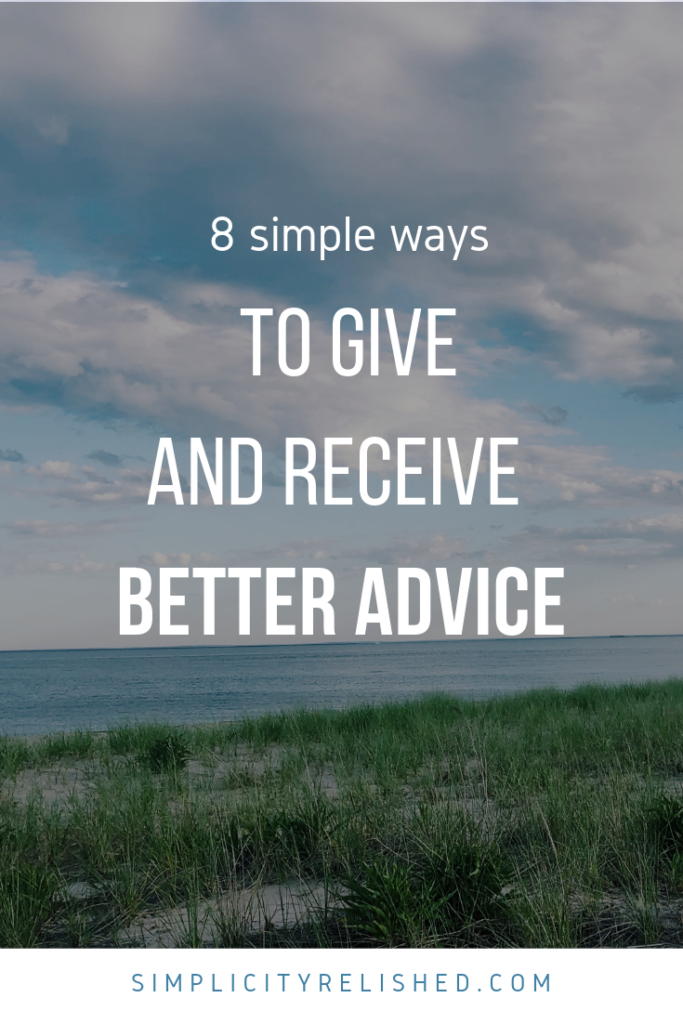When it comes to making thoughtful decisions and pursuing our goals well, good advice is something we crave. We also want to be the kinds of people who offer that good advice to others— it can be such a rewarding way to contribute.
I recently joined the advisory board of an organization and took part in an all-day meeting. Various staff members presented on projects and ideas for the board’s reflection and critique, which made me feel a deep level of ownership over my role as an advisor. In addition to that experience, I’ve informally advised numerous people and organizations– many of us have.
I’ve also relentlessly sought advice from people whose insights, skills, and experiences I value. We’re taught at a young age that adults know better, and for a while this mindset follows us. Sometimes I wonder if we’re still looking for the “adults” in the room, forgetting that we ourselves crossed that threshold years ago.
But here’s the challenge with advice, as with anything: its quality runs the gamut of the fullness of humanity. Advice is fueled by inspiration and wisdom at best, and tainted by biases and pridefulness at worst. It can be the product of thoughtful research and reflection, or of sloppy thinking and inattention. When spot-on, advice is something we want to live and die by. When it misses the mark, it can be incredibly distracting and even destructive.

May the advice-seeker beware.
Why do we seek advice? I used to believe it was about gathering the perspectives necessary to do things right. But now that I’m less a believer in absolute right decisions (they are rare), perhaps we seek advice to feel less alone. To invite dialogue is to reexamine the challenge we face, holding it up to the light for observation. When we seek advice in humility and openness, we place the idea at the center of the room, walk around it, look closely at it with an objective sensibility.
Oh, but how hard this is. One of the best insights I gained from business school this year was through guest speaker Ann-Mei Chang, former Chief Innovation Officer at USAID. She says that those of us who work for social change must fall in love with the problem, not our solution.
Those of us who love solutionism struggle with this. In fact, choosing to love the problem means we open ourselves up to being wrong, to starting over, and to realizing things are not as we believed them to be. It makes us not the hero-healers but the grievers and co-wrestlers against the complex challenges of our time.
What does this have to do with giving and seeking advice? It denotes the significance of deep listening and understanding before giving advice or even seeking advice. It means reaching beyond our usual circles of people who tell us exactly what we expect. It also requires examining our heuristics that enable us to think more quickly and efficiently; what are we missing?
4 ways to receive better advice
1) Identify your true needs and select your gurus wisely.
Author Emily P. Freeman discusses guru overload in her latest book, The Next Right Thing. What kind of voice do you need right now to better direct your decision-making? Think beyond the “powerful” people in your life and look at the margins, where perspectives might veer from the mainstream.
This can be difficult to discern if your ultimate goal is simply to feel good about yourself. Perhaps if that is the case, you actually need a challenger— someone who shakes up your mental models and asks questions you haven’t considered.
Or, perhaps you are experiencing high levels of stress about specific details and need someone to nudge you to look at the grander picture. Then what you need is less of a challenger and more of a calm sage to expand your perspective. Too many gurus are unhelpful. Eventually their advice will collide.
2) Boldly offer sufficient, logical information.
We’ve all been solicited for advice around issues we know very little about. While we can still be effective, we need enough information to comment thoughtfully on a situation at hand.
Give your advisers a transparent summary of what you know, including your own intentions and conflicts around the issue. Organize your thoughts well, as though you are telling a story. Help them enter into your mind space so they can be there with you.
If you can, force them to hear you out. Advisers sometimes jump to their own heuristics about what should work in what they perceive to be your situation, but gently lead them to engage with more nuance. Allow them to ask factual questions and be patient as you answer them. What you take for granted may not be immediately obvious to someone else.
3) Hear everything together.
All good advice will contain elements of both affirmation and critique. Unless your idea is truly terrible and there’s nothing of merit, you’ll probably get a mix of comments from your advisors. But those of us who are perfectionists often hear only the negatives, and those negatives can stick around for days. Others of us might prefer to ignore critique as a way of self-protection.
Instead of selectively hearing what either makes you feel better or worse, write down what you hear in the moment, including the praise. A lot of us don’t do this because praise tends to mean we don’t need to change anything. While that might be true, it is extremely important to remember what we should keep doing, and if nothing else, the fact that the advisor perceives value in what we’ve shared. Write down the critiques too, so you can review them later and evaluate them. And obviously, express your gratitude at the end of the conversation.
4) Reflect on the advice and evaluate the advisor.
Sometimes we walk away from conversations remembering less of what was said and more of how it made us feel. While this is natural, we need to dig deeper. After all, we seek advice not to feel a certain way but to see the issue in new ways.
If a meeting was intense, take a beat before going back to your notes from the conversation. Feel the emotions, express them, and center yourself to objectively observe the advice given to you. What did the person say that made you want to dig deeper? Why did they like or dislike something? Do their recommendations resonate with your deeper values and intentions? Do you see more clearly now (remember that seeing clearly is not always the same as being confident about your solution)?
Perhaps the advisor missed the mark. This is okay. It happens often, and doesn’t mean that you did not ask for advice well, or that they should no longer be your advisor. But before engaging with them again, make sure you are prepared to lead the conversation in a way that will hopefully yield better results.
4 ways to give better advice
1) Listen carefully and suspend judgment.
One surefire way to be a poor advisor is to react too quickly to what’s being shared with you. The person’s identity, position, or situation might make you feel a certain way, leading you to go down a thought pattern (a heuristic) that is thoroughly unhelpful to them. Control yourself, and take a breath. You don’t know the whole story yet.
One good way to avoid a hasty reaction is to force yourself to ask three deep questions before offering any advice. Note that the tone of these questions needs to be curiosity and not skepticism. The advice seeker might already be intimidated by you for a number of socially definable reasons; don’t abuse the power you hold in the situation. Instead, create space to discuss the object at hand.
2) Align with their values, not yours.
The worst way to share a piece of advice is to start with “If I were you, I would…”. The whole point is that you are not the advice seeker. Their problem is not your problem to solve, but they need you to enter into it with them. Do not replace them in the role of agency and authority; instead, support them in their agency and authority.
What does this person care about most, and how does your advice help them pursue those values? If you aren’t sure what they value, then ask. Try “Tell me what excites you about this,” or “What does success look like to you?” or “What motivates you to tackle this challenge?”. What you hear might be similar to your own convictions, or not. Tailor your advice to align with what you hear, not what you already take for granted in your own life.
3) Name your own biases.
If someone asks you for your “unbiased opinion,” you should immediately decline. You will always be biased in some way and that is a good thing— your bias comes from experience and your experience is what the advice seeker is after. However, not all biases are useful, and some may be destructive.
Beyond our racial, socioeconomic, and gender biases, we are also biased according to our education, social position, and personal modes of operation. For example, I am biased toward action. My inclination is often to respond with “So what are you going to do about that?” I have to recognize that action is not always the right advice for someone’s situation. Perhaps patience is better advice, or forbearance, or even silence.
If you’re accustomed to giving advice from a position of authority, weigh that bias carefully. You can even offer it to your advisee by saying “People come to me a lot about XYZ, and I usually have these things to say. Help me understand your situation so I can support you better.” Perhaps what they need is indeed for you to act in your area of expertise. But perhaps what they need is the opposite.
4) Ask for feedback.
Request advice on your advice? Yes— or the person might not come back, and you probably have a lot to offer. Don’t cheat yourself or your advisees by assuming you did them good without actually verifying. When advising others, I usually break up the conversation with “How does that strike you?” or “Does this resonate with you?”. Sometimes the answer is yes, but sometimes it allows the person to point out misunderstandings.
The fact that you are being solicited for advice indicates you probably have some meaningful power. Many of us are socialized not to push back against powerful people, so you need to take ownership of the possibility that people aren’t being honest with you. Consider what they feel is at stake in the conversation, and cross that boundary to demonstrate your genuine desire to be helpful. Your advice should never become a means to control the person or exert influence where it doesn’t belong.
A final word: leave room for humanness
No one is perfect. Not the advice-seeker nor the advice-giver. A seeker might stubbornly refuse to hear advice that would really help them. A giver might get stuck in their own inaccurate perspective. We are human, and we’ve all done these things.
The good news is this: in giving and receiving advice, we are engaging in a dialogue around something that we would perhaps be facing on our own. We enter into each other’s troubles and hopes. This engenders community and collaborative creativity, and that is always worth pursuing.


